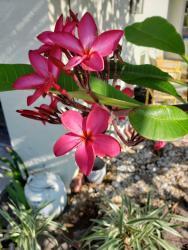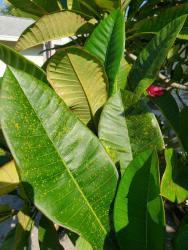sooby said:to All Things Plants. Not sure where you are but it looks like a rust fungus, presumably Coleosporium plumeriae:
http://www.padil.gov.au/maf-bo...
Some suggestions for treatment from Florida are here, scroll down to frangipani/plumeria rust:
https://edis.ifas.ufl.edu/pp17...
Perhaps someone in a climate where plumeria grows has experience of dealing with this disease but typically with rusts you need to try and keep the foliage dry as much as possible, and aim for good air circulation. I don't know if fungicides are an option for you or what might be available where you are.
dyzzypyxxy said:Yes, plumeria growing outdoors in humid climates can get this rusty looking fungus every year in the late summer into fall. It doesn't kill the plant but it sure can make them look terrible and lose a lot of leaves earlier than they normally would.
Unless you go for a vigorous anti-fungal spray program early in the year, there's really not much to do about it except housekeeping - immediately remove any leaves you see it on to prevent the new spores from flying around and infecting more leaves. Pick up any leaves that fall off the plant too, if they have it. Put them in a bag and trash them, don't compost them.
Spraying the leaf surfaces with a mild baking soda solution can slow down the spread, though. About 1/2 tsp. baking soda dissolved in a quart of water and sprayed on all leaf surfaces changes the pH on the leaf surface and deters the fungus. But you have to keep putting it on because (of course) it's highly soluble and washes off in rain or with watering.
Btw be sure to water your plumeria and all your plants early in the morning, not at night to help prevent fungus infection and spread. If the foliage sits with water on it overnight, it's inviting fungus to form. Watering early allows the plant to dry off by nighttime, provided it doesn't rain of course.

